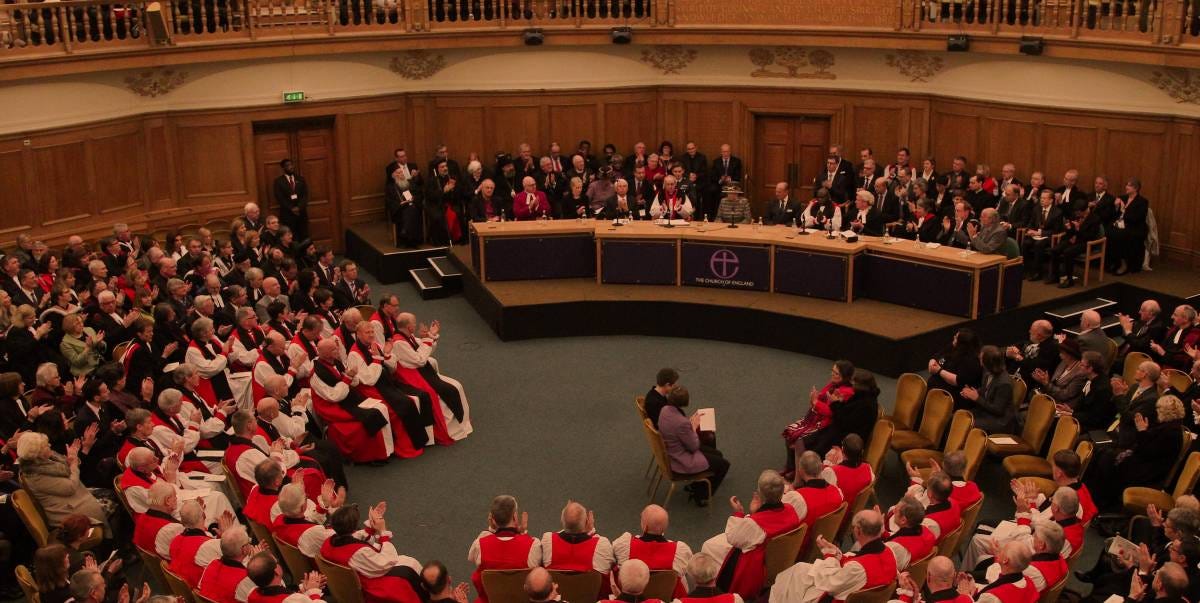Synod confuses liberalism with tradition
General Synod is like a political rally, writes George Pitcher, but views expressed are not always what they seem
The General Synod is usually described as the Church of England’s parliament. But it isn’t really. It’s more like a political party conference, at which various factions gather in a single cause, in this case the Christian faith.
Like old-fashioned party conferences, there are motions, debates and resolutions, with cheering for those whose will triumphs and tears from those who fail. For, as with political parties, all factions believe they are defenders of the one true faith.
So it is with the one that has just finished at Church House in Westminster. What is decided at Synod may glacially change the Church, but Synod itself never really changes. It is a smugfest. The laity feel smug because they’re not ordained but wield power here, the clergy feel smug because they’re not laity and the bishops feel smug because they’re bishops.
And, up in the press gallery, the journalists feel smug because they’re going to sneer and satirise and ignore the imprecations of underpaid diocesan communications officers. I don’t attend Synod anymore but, trust me, this is how it was and will ever be.
Spirit of consistency
So, in the spirit of consistency, let me be smug. This year I have written here that we need to talk properly about gender, because both sides of the same-sex marriage debate have been woefully misrepresented. And, separately, I wrote that the Church of England is gradually disestablishing itself by relinquishing its role as a national arbiter of religious doctrine, in favour of a loose federation of congregations who believe different things.
Both those viewpoints were thoroughly vindicated by the Synod just finished. That’s my smug claim. But I think Synod demonstrated a further point that I want to make now. Both sides of the Church’s gender debate are not only misunderstood but wholly misrepresented. What are called liberals and traditionalists actually hold diametrically opposed opinions to those that are ascribed to them.
Non-gendered language
Take the distraction from the main business of Synod that was the reference to non-gendered language relating to God in worship. This was manna from heaven for the Press Gallery, which set about splashing that “Our Father” is to be withdrawn from the Lord’s Prayer (it isn’t), while the informationally-challenged Nigel Farage consequently called not just for the Church to be disestablished, but for its abolition.
What actually happened, in response to a written question at Synod, was that the Church’s Liturgical Commission confirmed that it continued to explore opportunities for gender-inclusive language about God in worship.
In doing so, it acknowledges that God in scripture is explicitly beyond gender categorisation. In creation, God makes both man and woman “in his own image”. In the book of Proverbs, Wisdom is “a woman who cries out in the street” – for all interpretative purposes, Wisdom is the third person of the Trinity from the gospel, the Holy Spirit. None of this was a problem for the early Church in its first century; there were no such things as deaconesses in it, only deacons, both men and women.
Red-faced and white-knuckled
So those who now seek gender-neutral language for worship are not the “woke”. They are the traditionalists that the red-faced and white-knuckled, spitting their spoons over the Daily Mail, so fondly imagine themselves to be.
Meanwhile, a word on behalf of the traditionalists in the same-sex marriage debate. These people are assumed – and not just in the liberal media – to be the bigots and misogynists and, more particularly, the homophobes of popular imagination.
Another way of looking at them is that they are defenders of gender. Yes, they might see marriage as a gift of God in creation and represented by the inherent conjugality of male and female, whether they are going to produce children or not. So far, so debatable.
But, in that context, they see genders that are to be defended in the institution of marriage. So in a sense they are the defenders of gender-definition just as much are those who have fought and continue to fight for women’s rights, hard won over the past century.
Hideously trolled
The likes of writers such as Suzanne Moore and JK Rowling are hideously trolled for holding that a transwoman is not a biological women. The same case can be made for the definition of a marriage: Two people of the same sex cannot biologically be a marriage. In arguing this view, the so-called traditionalists have more in common with social liberals than even they might recognise.
We may, of course, be counting angels dancing on a pinhead, while people die in war in Ukraine, of natural disaster in Turkey and Syria and famine in Sudan. But these matters are important in that they question who we are as a Church. And the answers may surprise us.
Because in our Anglican Church, there remains radicalism in our tradition and ancient scripture in our contemporary liberation.
George Pitcher is a visiting fellow at the LSE and an Anglican priest




